Dice Hospital review — Roll with the theme
![]()
-
Hospitals are intriguing yet terrifying places. Cold steel, disposable gowns and the smell of bleach are what turn most of us away, not to mention the association that hospitals have with sickness (and worse.) Yet somehow, a few creators have managed to make hospitals into an engaging, fun theme. Alley Cat Games’ Dice Hospital is one such game – and for video game fans, it will immediately conjure up feelings of playing Bullfrog’s classic simulator, Theme Hospital.
Overview and turn structure
Dice Hospital is a remarkably simple game, yet despite how easy it is to play, it presents players with increasingly more complex choices until around its third quarter, at which point it becomes a straight race to score maximum points. As the name suggests, players in Dice Hospital will build and run a hospital, but the dice part relates to the patients – each of which is a dice presented in one of three colours.
Dice Hospital supports one to four players (with a dedicated solo mode) and over the course of around an hour, eight rounds of dice will arrive at each hospital in the hope of treatment. The first player in the previous round will have the choice of ambulance (except the first,) and whoever ends up with the lowest numbered ambulance will act first this round and also take a blood pack as a bonus. Why all the fuss about the lowest numbered ambulance? Well, the dice are drawn randomly, but the lowest numbered dice also go in the lowest numbered ambulance – meaning that they need the most urgent treatment.
Three dice are added to each hospital with each intake (there are no exceptions to this) and they will be placed into one of the twelve slots on the hospital board. If there is no space free on a players hospital board for one or more dice, then an existing dice must be replaced (ie left to die) and a morgue token will be added. As you can probably imagine, morgue tokens will result in negative points at the end of the game, whilst a much more positive outcome – healing dice past six – will enable them to be discharged, which will score points immediately.
After the intake of new dice, all dice will be shown in the awaiting treatment section of each hospital. The players begin the game with three nurses who can be assigned to the basic treatment rooms in order to heal those dice. Basic treatment rooms will allow a single red, green or yellow die to be healed by one pip, or for dice of any colour (but with specific values) to be healed in the same way. Each round, however, the players will have one chance to add an improvement – either a new room or a specialist who brings both a specific power and another pair of hands.
Hospital upgrades allow players to harness powerful effects that can heal up to three dice in one go – either because they are the same colour, or in a sequence, or as the result of some other pattern. Specialists offer slightly less powerful benefits such as being able to heal a second dice each turn,but what makes them really useful is the fact that any specialist can be placed in any room, which allows players to create powerful combinations of upgrades and specialists.
The more dice a player heals each turn, the more points she will score, and some Administrators (cards taken at the start of the game) add bonus points for certain combinations of dice. After eight rounds, the player with the most points (after morgue deductions) wins. There are a couple of variants including a solo mode that is driven by its own deck of cards, as well as variant rules for a hard mode (which personally, I enjoyed) and suchlike.
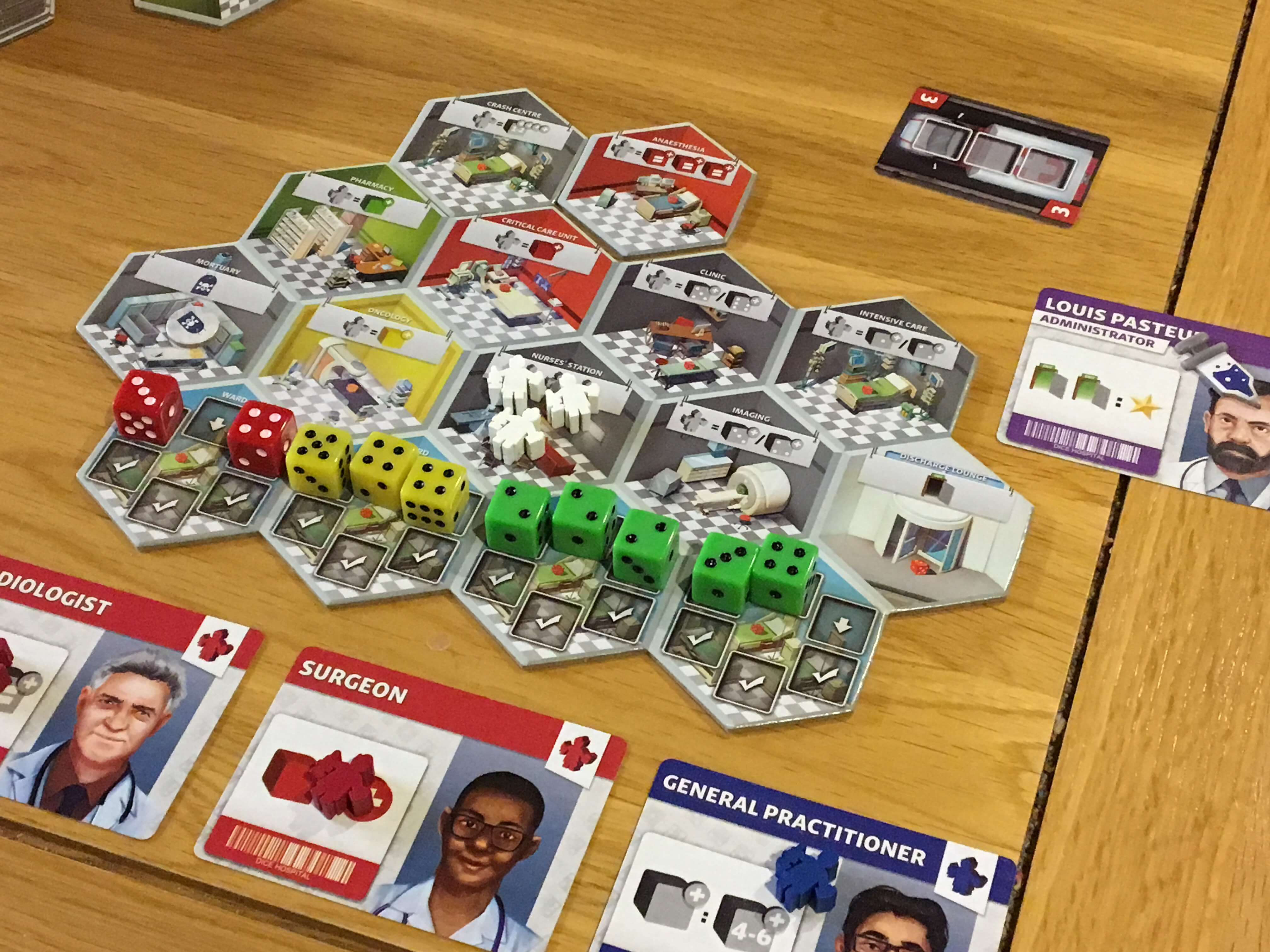
Components
Whilst I’m not intending to pun on it too strongly, Dice Hospital is an attractive but somewhat sterile looking game. It features artwork that is functional and clear, but far from exciting. That said, Dice Hospital does include the rather cute use of dice as patients in hospital beds, CT scanners and suchlike if you look very closely. Regardless of how it looks, Administrator and Specialist cards feature generally uninteresting – albeit diverse – artwork that represents the people who will work in each hospital.
Whilst the artwork might be a little dull, the overall component quality in Dice Hospital is high. The player boards (each of which comprises of a four by five by four hexagonal arrangement) are thick and exceptionally well cut, which means that the hospital improvements (each an individual hex) fit perfectly into them as each hospital expands. The meeples (nurses and specialists) are wooden and cut exceptionally well, with an unusual amount of definition – including tiny syringe.
Perhaps more importantly than the pure aesthetic of the game is the manual, which explains the game simply, over about four pages, using calls out to deliver examples wherever needed. Setting up your first game of Dice Hospital and playing the first few turns is very simple, with the only slight complexity arising from explaining exactly how the turn order works, which is thanks to those ambulances and the way that first place from one round sort of bleeds into the next, before (potentially) switching depending on who chooses the lowest numbered ambulance.
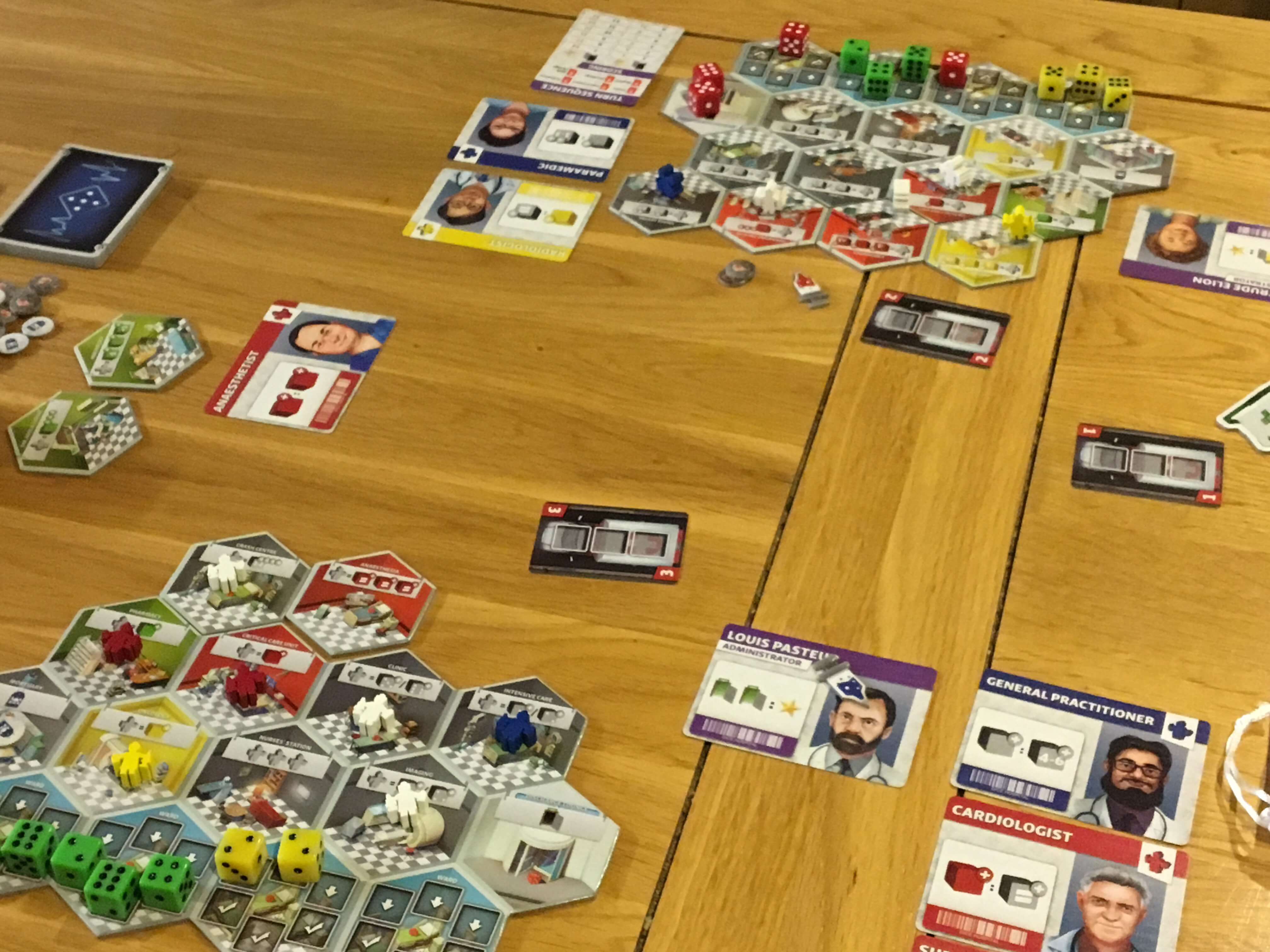
Game experience
Dice Hospital, as I mentioned earlier, begins as a relatively fraught experience. Dice come into the hospital faster than they leave, but the initial setup allows for that. Even so, by the time two or three rounds have passed and a few improvements or specialists are added, the hospital will be close to full. By this point in the game, players will already have twigged on to some of the slightly odd practices in Dice Hospital. For example, they might be treating patients in sequence to enable chain combos, or they may even be holding back healing certain patients in order to increase their score on a later turn.
You see, Dice Hospital has a lot of surface level thematic appeal, but the game itself is a pure mathematical efficiency puzzle. You may feel inclined to prevent dice from “dying” but in actual fact, you won’t hesitate to let it happen if you know for sure that a sequence of dice will be healed this turn – scoring you a bonus that far outweighs the loss of one die. That said, I’m not underselling it – the puzzle itself can be tough to figure out and no matter whether your turn was as efficient as it could be or just OK, it always feels good to move three or four dice into the discharge area as the result of a well orchestrated turn.
Dice Hospital is also well balanced, thanks to an initially complex, but smart player order system. Having the first player from the last turn choose their ambulance first seems odd at first, but since they can never choose the number one ambulance, the next player will always have the ability to choose first place if they wish. Doing so gives them first pick of the improvements and allows them to take a blood pack, which can be used to heal any die by one point (or change its colour for a single action.)
Few games make the price of acting first so high, but even fewer make it as rewarding either, and Dice Hospital draws a clear line between playing it safe or going for broke that players can tack against and clearly identify depending on their circumstances.
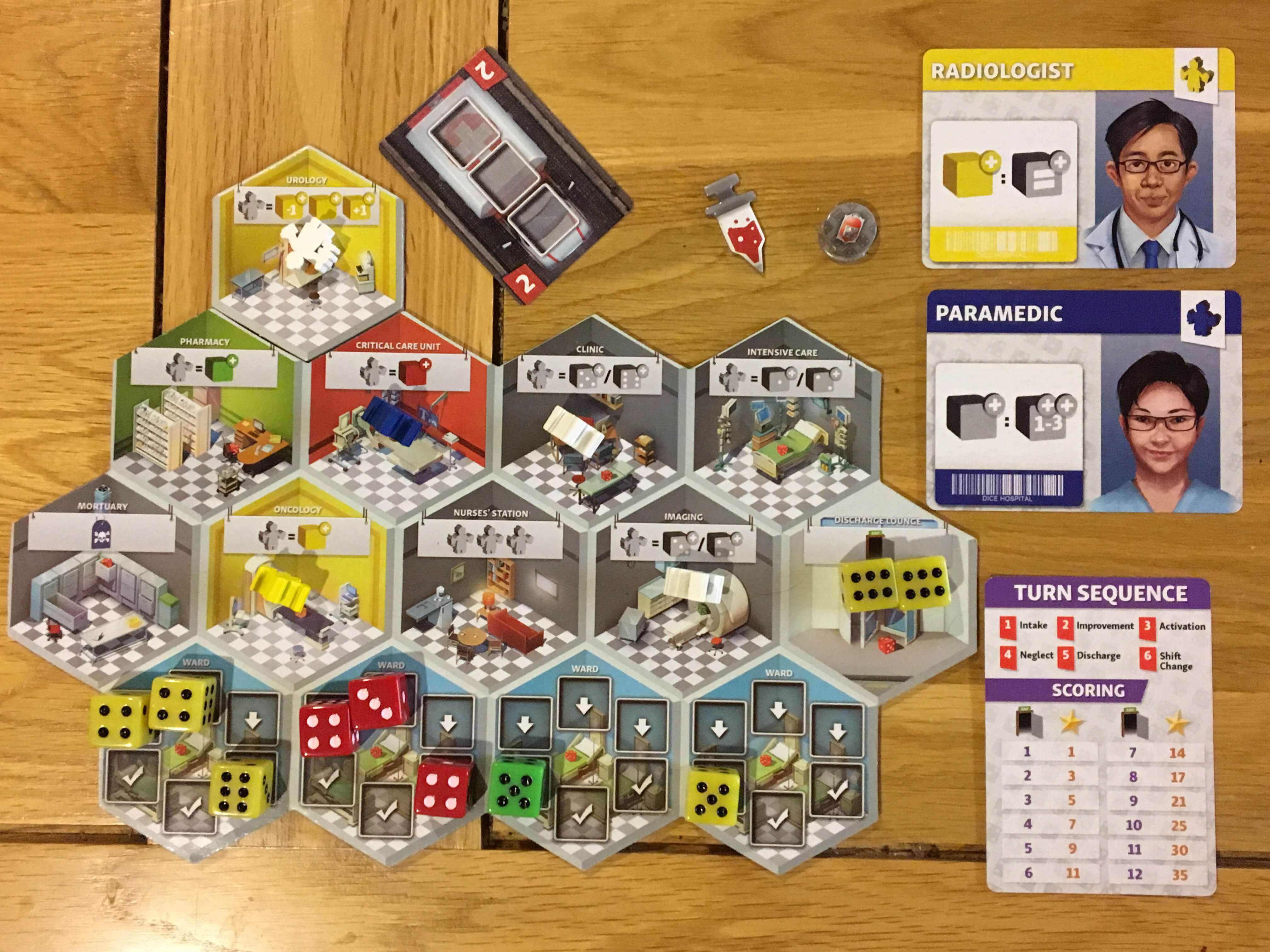
Conclusion
In general, I mentally rate games based on weight from very light to very complex and I attempt to choose games that will suit my audience. Dice Hospital puts me in somewhat of a quandary because it is so light and simple to pick up and learn, yet quite taxing to play and do well at. The concepts are simple and could be understood by anyone of almost any age, yet planning the most efficient route through each turn (especially as the hospital expands) is tough.
That’s not a bad realisation however, since few games can offer a satisfying experience to both newcomers and experienced hands alike. Dice Hospital could be a tad more attractive, but the look actually fits the subject matter. Overall, I like Dice Hospital at all player counts and with a wide variety of audiences, and as such I am inclined to suggest that it has a place in any collection. This is one game that I’d love to see expanded in the future and will be keeping a close eye on.
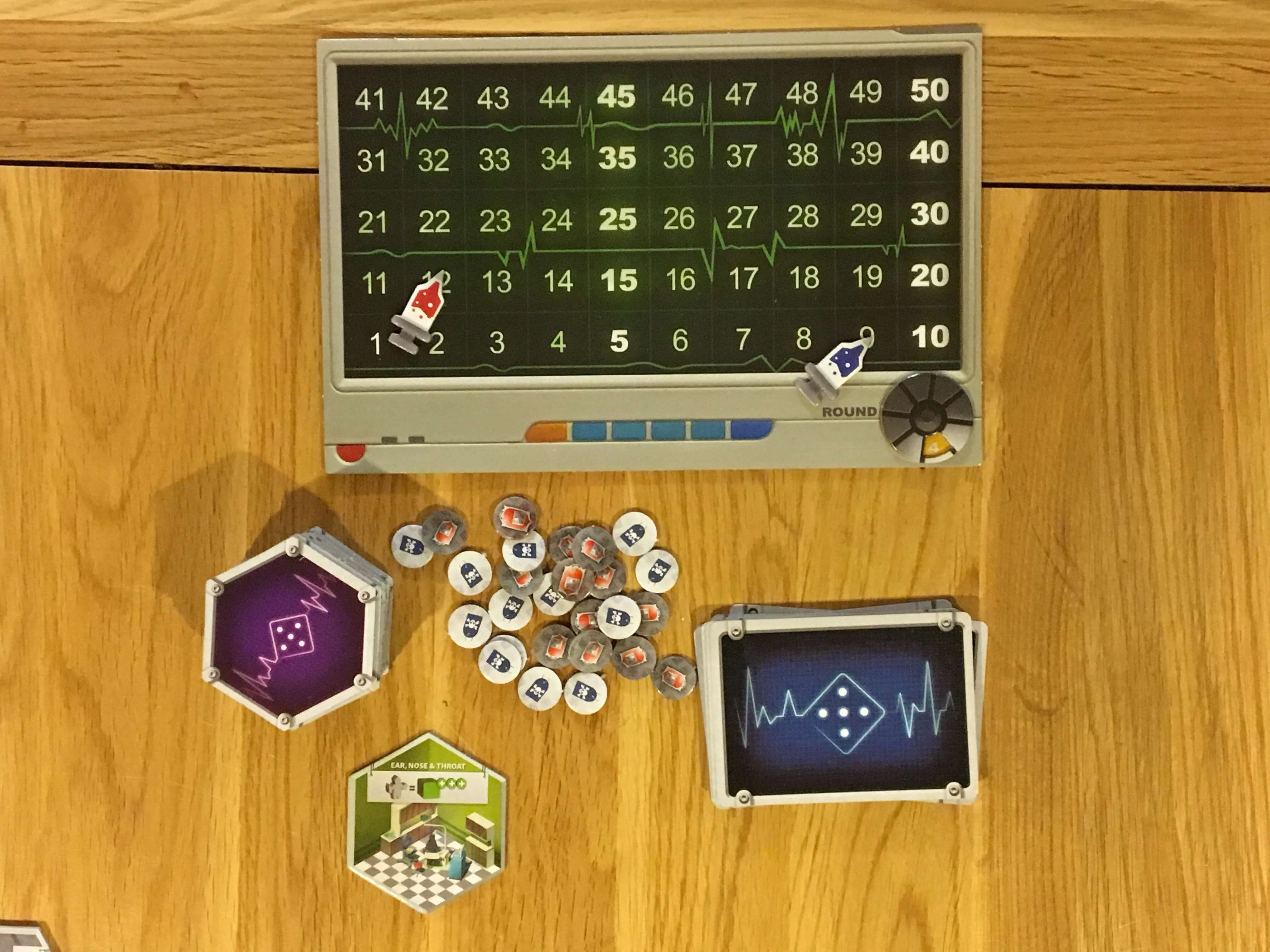
A copy of Dice Hospital was provided for review purposes, and can be purchased from all good local games stores. For online purchases, please visit 365 Games
Love board games? Check out our list of the top board games we’ve reviewed.
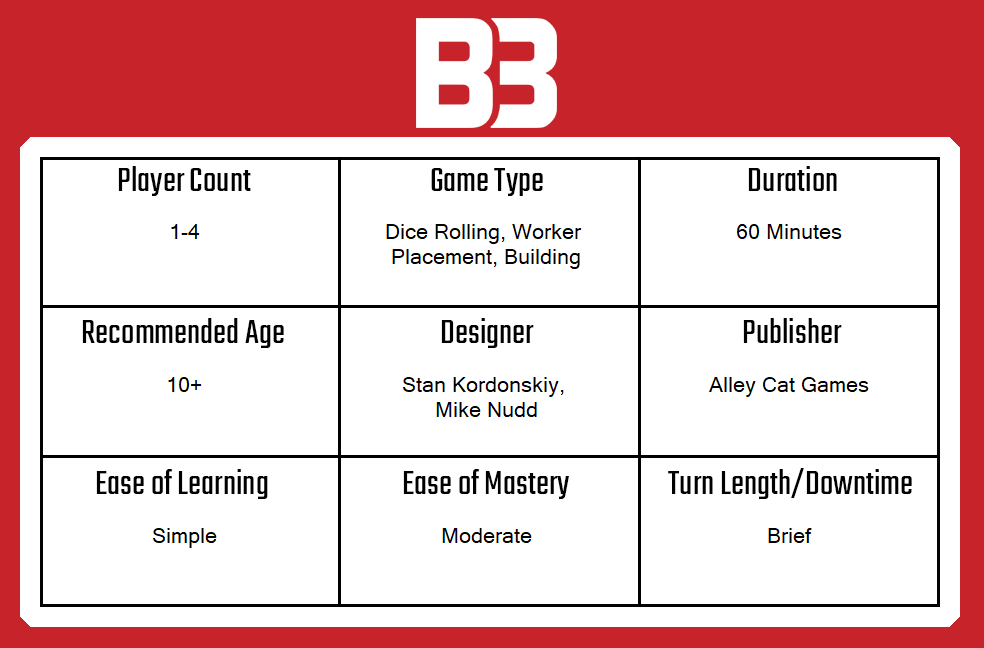
Comments are closed.